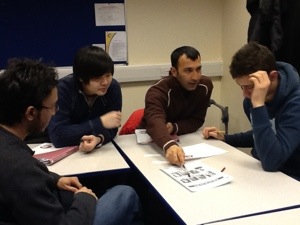It’s Friday afternoon. It’s time for the last of our ten two-hour lessons this week. The last thing my students want to do is learn, especially when it’s cold, dark and snowing outside. Cutting Edge to the rescue!
This afternoon my upper intermediate class designed two soap operas. There was much laughter, a lot of speaking in English, and two great stories by the end of the lesson, with the added benefit of some much-needed revision of verb + gerund/infinitive which we were practising yesterday.
In the activity, the students get a page of photos of people. They decide on biographical details, the setting for their soap opera and a name for it. They then plan the next episode with the help of three ‘plot cards’. Finally, they write a summary of the storyline for the episode using some of the verbs which take gerund/infinitive. The activity is from New Cutting Edge Upper Intermediate Teacher’s Resource Pack, pages 142 and 143.
I can’t reproduce the worksheets here, but I can share photos of my students using them:

Here are their stories:
The girls
Mark decides to kidnap Cookie (the baby) so he threatens to kill Cookie if Samantha doesn’t pay him £1 million.
At the same time Laura and Chris plan to get married after finishing school. Alice, who loves Chris, can’t stand seeing them so happy so she manages to split them up.
Richard promises to pay the money for Cookie’s freedom.
Samantha considers telling Mark the truth: Cookie is his son!
The guys
Chris manages to become a famous football player. Alice denied having had a relationship with Richard, when Mark asked. Samantha avoids telling Chris about Richard and Alice’s relationship. Mark can’t stand seeing Chris and Alice, but he loves being with Laura.


